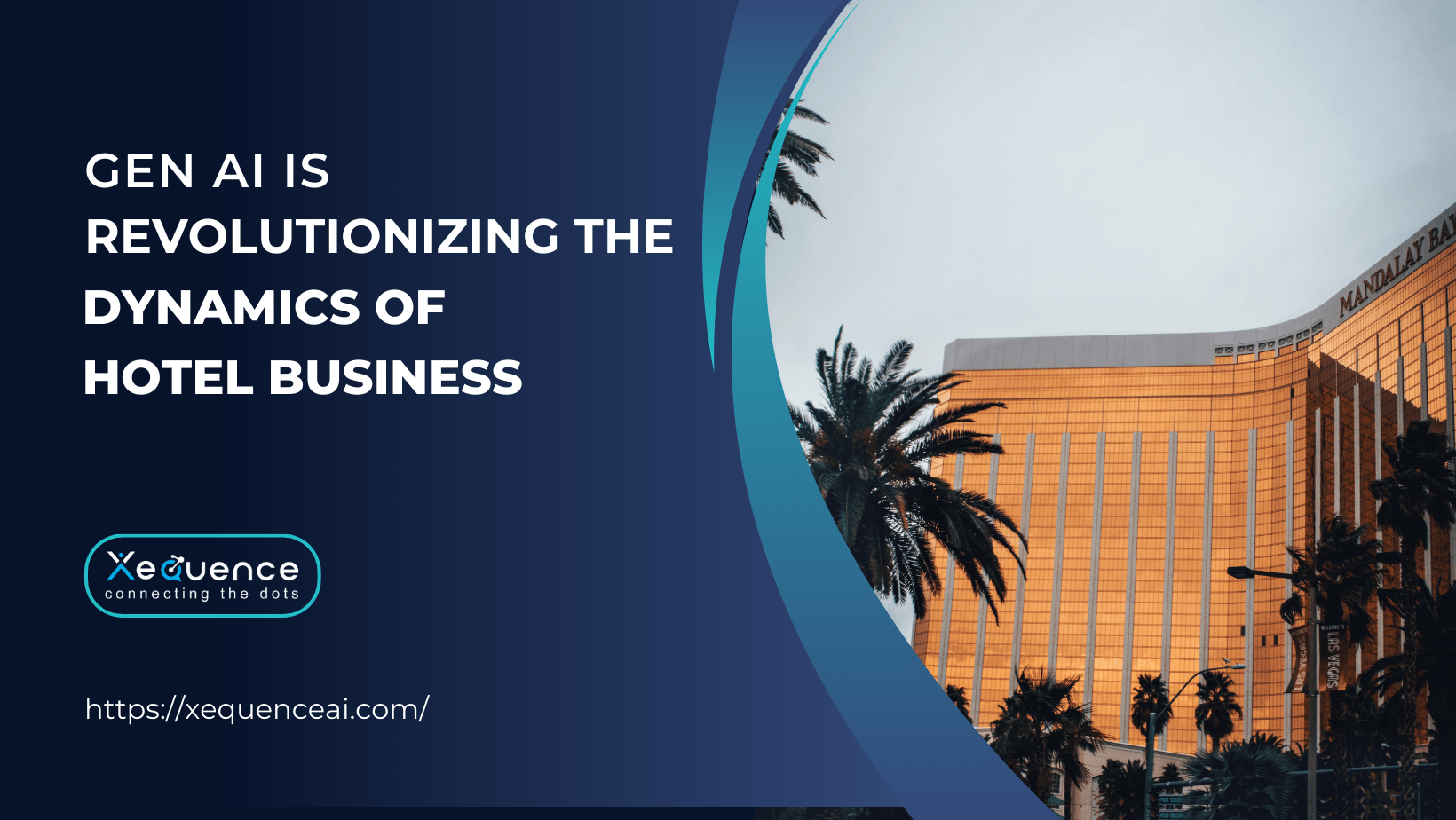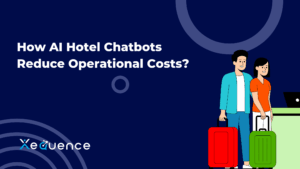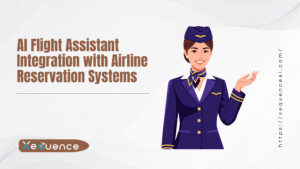- Home
- Artificial Intelligence
- Gen AI is Revolutionizing the Dynamics of Hotel Business
Gen AI is Revolutionizing the Dynamics of Hotel Business
- January 11, 2025
- Rajib Kar
- Artificial Intelligence, Chatbot, Gen AI

How Gen AI is Revolutionizing the Hotel Industry’s Business Dynamics
Do you think the tech titans are the ones who only use artificial intelligence? Change your mind now! This is not the reality these days. Hotels can now improve visitor experiences and streamline operations thanks to generative AI, which is transforming the hospitality sector. This technology is revolutionary in terms of increasing guest happiness and reducing expenses. Gen AI is used by more than one-third of travelers to plan vacations, make reservations, and find ideas for destinations. This technological boom is forcing the hospitality sector to reconsider their online customer service strategies. Additionally, by automating repetitive operations, it maximizes resource allocation and frees up workers to concentrate on providing individualized service. This blog post will explore the ways in which hotels can enhance their direct channels by utilizing generative AI.
Impact of Gen AI in Hotel Industry
- Personalized Guest Experiences
- Chabot’s and Virtual Assistants
- Dynamic Pricing and Revenue Management
- Predictive Maintenance
- Voice-Activated Room Controls
- Facial Recognition for Check-in and Security
- AI-Enhanced Guest Feedback Analysis
Here are the key AI use cases in the hospitality industry
Personalized Services
AI is being used by virtual assistants to provide unique experiences for your guests. Smart speakers and apps that can recommend eateries, advise visitors about nearby locations, create customized calendars, and even regulate the temperature or lighting in a room to use them.
Research has shown that when users have access to cutting-edge interactive technology, they enjoy it. As a result, these assistants provide guests with a more affluent and comfortable experience, which increases their happiness.
Customer Experience
One of the most common uses of AI is through chatbots. It is used for various purposes. In order to assist and satisfy visitors, they are frequently utilized on hotel websites and applications. Asking questions, making reservations, and providing hotel information are all possible with these clever solutions. The prompt responses and round-the-clock availability of Generative AI satisfy guests and lighten the team’s workload. By answering customer questions around-the-clock, they not only cut down on wait times but also increase brand trust.
Feedback Analysis
Chatbots created by AI revolutionize the process of gathering guest reviews. To find out the feelings and satisfaction levels of their visitors, they employ sentiment analysis and natural language processing. By knowing what visitors think, it is simple to know how to provide services that meet the needs and preferences of their clients. The quick feedback loop also enables hotels to take prompt action to avoid any harm to overall guest pleasure and loyalty by providing them with information about issues and mistakes as soon as they occur.
Language Translation
Virtual assistants and chatbots are adept at translating between languages. so that even though they speak different languages, visitors and employees may communicate easily. Visitors feel more at ease and conversation is made easier as a result.
This not only helps them be more welcoming to tourists from around the world, but it also ensures that you are prepared to serve your visitors by bridging language hurdles. When users can do tasks and interact in their native languages, it creates a welcoming environment and increases the likelihood that they will return.
Streamlining Operations
Artificial intelligence (AI)-powered assistants streamline hotel operations by expediting repetitive tasks and providing clients with immediate assistance. By managing reservations, answering questions, and providing information on the hotel, the virtual concierges free up human staff to concentrate on more intricate service-related tasks.
The assistants driven by AI will complete monotonous jobs. These results in a smoother visitor experience, lower expenses, and increased production. The fact that guests can easily contact AI-powered assistance and receive round-the-clock support is another benefit.
User Behavior Analysis
Hotels may employ data analysis and user activity tracking to create focused strategies thanks to AI-based analytics. The capacity to evaluate clients, reservations, and market trends enables recommendations to be made with the goal of enhancing operations and financial gains. AI is capable of anticipating periods of high demand through past data and analytics.
Pricing Structure
The most competitive market rates for rooms can be found with AI-based pricing that uses a data-driven algorithm. AI can change room prices based on past booking trends, demand curve analysis, rival pricing data, and visitor preferences, thereby maximizing income and occupancy for the business. AI-based pricing strategies also help with the capacity to adapt fast in reaction to changes in the market and the preferences of passengers.
Upselling and Cross-selling
Upselling and cross-selling additional services or upgrades to hotel visitors can be accomplished with the help of bots and virtual agents in these situations. Artificial intelligence (AI)-driven systems may readily suggest solutions that match the interests of guests by examining their past behavior, habits, and market trends.
In addition to upselling to boost hotel revenue, it provides visitors with individualized and customized service to enhance their stay and happiness. Hotels can also increase sales and maintain satisfied and devoted customers by implementing the focused two-way strategies of upselling and cross-selling.
Personalized Deals
Thanks to artificial intelligence, hotels can now offer exclusive rates and tailored offers based on visitor ratings and behavior. Hotels may classify visitors according to their online booking history, preferences, and spending patterns using data analytic models and machine learning algorithms. By providing customers with personalized options, these hotels can significantly increase their sales. By making a personalized offer that optimizes reservations and wins the loyalty of the guests, such a customized approach to pricing makes their stay enjoyable.
Advantages of hotel artificial intelligence in hotel
AI chatbots allow you to provide your guests with incredibly customized experiences. Artificial intelligence can forecast preferences and adjust services by analyzing visitor data. Customized dining and activity suggestions, personalized hotel arrangements, and prompt service delivery are a few examples of this. Personalized care like this can greatly increase repeat business, loyalty, and guest pleasure. AI assists you in putting into practice dynamic pricing techniques that modify hotel prices in response to current market conditions and demand. By selling at the best prices, this guarantees that you make the most money for every room that becomes available. Moreover, AI-powered marketing tools aid in the creation of customized advertisements, which boost direct reservations and total income.
Conclusion
AI has the ability to significantly enhance the hospitality industry’s service component. There is no need for official identification or check-in if an AI can instantaneously connect with your phone or use facial recognition. There won’t be any waiting between checking into the hotel and getting settled in their rooms if they have a mobile room key. AI will enable instantaneous guest communication, eliminating the need to call or wait for someone to take your order. Even AI bots may bring the food or drinks automatically. When it comes to cleaning and getting ready for visitors to arrive, AI systems will be incredibly effective at scheduling and upholding standards.
Recent Posts
Newsletter
Get regular updates on data science, artificial intelligence, machine
You may also like

AI Travel Assistants: The New Personal Travel Planners

5 Things an AI Travel Assistant Can Do in Seconds

How AI Hotel Chatbots Reduce Operational Costs?




